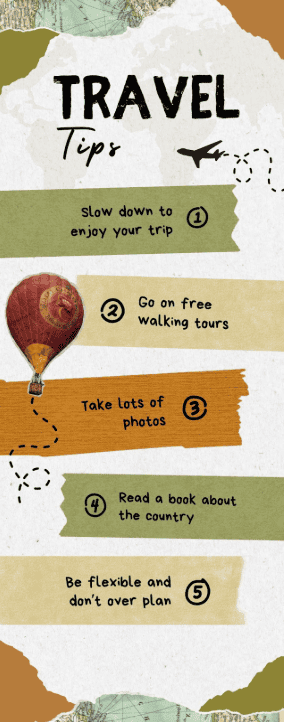
Photo by Eva Darron on Unsplash
Travel promises adventure, relaxation, and cultural discovery — but without proper budgeting, it can also become a financial headache. Whether you’re planning a romantic escape, a family vacation, or a solo backpacking journey, having a clear and realistic financial plan ensures your trip brings joy without debt.
Smart budgeting allows you to enjoy the moment while staying in control of your long-term goals. It’s not about cutting out fun — it’s about planning for it wisely!
By breaking down your travel costs and learning where to save or splurge, you’ll set yourself up for a rewarding experience that doesn’t haunt your bank account later. Here are 5 tips to help you budget your travel smartly and efficiently!
This site is part of an affiliate sales network and receives compensation for sending traffic to partner sites. This compensation may impact how and where links appear on this site. This site does not include all financial companies or all available financial offers. See below for full disclosures.
Want to earn free travel? Learn more about one of my favorite credit cards to get started!
Building A Holiday Budget
Crafting a personalized travel budget is the essential first step to turning your travel dreams into practical, affordable plans.
Start by determining your total budget cap — the absolute maximum you’re willing or able to spend. Use recent financial statements to understand what’s feasible without disrupting other priorities, like rent, bills, or savings goals.
Once you set a ceiling, break it into core travel categories: transportation, accommodation, meals, activities, shopping, and emergency funds. This compartmentalization helps you see where you have flexibility and where you don’t.

Next, research the average costs for your destination. Don’t rely solely on influencers or glossy websites — check real traveler forums, flight aggregators, and local restaurant menus online to get a clearer sense of expenses.
Use helpful apps like Trail Wallet or Excel templates to track expected costs per category. This pre-trip planning also allows you to spot savings opportunities early, such as discounted passes for attractions or free walking tours.
Choosing The Right Destination For Your Wallet
Where you go has a massive impact on how much you’ll spend, so make location your first budgeting filter.
Popular cities in Western Europe or North America often have higher baseline prices for lodging, dining, and attractions. In contrast, Southeast Asia, parts of South America, or Eastern Europe may offer more value for the same experiences. This doesn’t mean choosing the cheapest place — rather, it’s about aligning your expectations with the financial reality.

Consider exchange rates, seasonal travel patterns, and local costs of living. For instance, visiting Japan during cherry blossom season or France in July will likely double your costs due to tourism demand. Travel in shoulder seasons — such as early spring or late autumn — can unlock much better deals without sacrificing weather or accessibility.
Opt for destinations with a strong infrastructure for independent travelers. Cities with reliable public transport, extensive free museums or parks, and safe street food can stretch your funds further than those dependent on taxis and ticketed tours.
Finally, if you’re flexible, use flight tools like Google Flights or Skyscanner’s “Everywhere” search to discover destinations that fit your budget, not just your bucket list. Daily Drop Pro is an excellent tool for saving money on flights and hotels – you can even search by loyalty programs!
Saving On Transportation
Getting there and getting around can consume a significant chunk of your budget. But there are clever ways to cut transport costs without sacrificing comfort when you budget your travel smartly!
Start with flights: book in advance and use incognito browsing to avoid price inflation from repeat searches (this tactic doesn’t work as well as it used to, but it’s still worth trying).
Price alert tools like Hopper or Kayak Notify can help you pounce on fare drops. Don’t forget regional budget carriers — especially in Europe and Asia — which offer competitive rates but may charge extra for luggage, so pack light.

For domestic travel, weigh the cost of flights versus trains or buses. In countries like Germany or Japan, rail passes offer incredible value for multi-stop trips. Renting a car? Compare aggregator sites and look for codes via credit card perks or member deals like AAA or AARP. When comparing car rentals, factor in fuel efficiency, tolls, and insurance.
Once at your destination, walk or use local transport whenever possible. In cities like Prague or Lisbon, public transport is not only cheap and safe, it’s also efficient. Download apps like Citymapper or Rome2Rio to navigate systems smartly.
Some cities offer tourist transport cards that bundle buses, metros, and museum access at a discount. Avoid taxis unless necessary — rideshare services like Bolt or Lyft often offer better pricing and transparency.
Accommodation That Balances Cost And Comfort
A great place to stay doesn’t have to drain your wallet, especially if you think beyond traditional hotels. Platforms like Airbnb, Vrbo, or Booking.com offer flexible options that range from shared flats to private villas.
If you’re staying more than three nights, consider places with kitchens to save on food costs. Look for properties with free cancellations — this gives you a safety net if your itinerary or price options change.
Hostels aren’t just for students anymore! Many offer private rooms with ensuite bathrooms at prices far below hotels. Boutique guesthouses and locally run inns can also deliver more character, often with breakfast included.

If you’re traveling with others, splitting the cost of a two-bedroom rental is often cheaper than booking multiple hotel rooms. Loyalty programs can also play a role. Booking several stays through one provider (like Hotels.com or Marriott Bonvoy) can earn you free nights or upgrades.
Finally, location matters: staying in the city center may be more expensive, but if it saves you on daily transport costs or lets you walk to attractions, it might be worth it. Always do the math – that will help you budget your travel more efficiently.
Your FREE Carry-On Bag Travel Guide
Pack smarter and more efficiently with this FREE carry-on bag travel guide. Learn how to pack essentials, keep electronics safe, and more on your next travel adventure!
Eating Well Without Over-Spending
Food is a core part of travel, but dining out three times a day can wreck your budget unless you plan wisely.
Start by identifying meals where you’re willing to splurge — like one fine-dining experience or a locally famous dish. Offset these with budget-conscious options: local markets, food trucks, or casual cafes. In many cities, lunch specials offer the same quality as dinner menus for a fraction of the price.
Book accommodations with breakfast included — it saves money and time in the morning. For longer trips, visit local supermarkets or delis for snacks, picnic supplies, or light meals you can prepare yourself. Apps like HappyCow or Yelp help identify cheap eats, especially for dietary restrictions like vegan or gluten-free.

Water can also be a hidden expense — check if tap water is safe to drink where you’re traveling. Carry a reusable bottle with a built-in filter if needed. Avoid hotel minibar temptations and opt for convenience stores or local bakeries for evening snacks.
Don’t skip street food — just be smart. Go where locals go, look for vendors with long lines and high turnover, and trust your nose and eyes. This is where budgeting meets authentic cultural experience.
When you budget your travel smartly, you can make the most of your trips!
Smart travel budgeting doesn’t mean sacrificing joy — it means amplifying it through intentional choices. By designing a trip that aligns with your financial comfort zone, you free yourself to explore, experience, and enjoy without guilt or anxiety.
Break down your costs, stay flexible, and think like a local wherever you go. With a thoughtful plan, your next big trip will be as kind to your wallet as it is unforgettable.
Do you have any smart tips that you use to budget your travel? Let me know in the comments below!

Want to read this post later? Save it on Pinterest!
Looking for more travel tips and ideas? Check out my favorite travel products and some of my other posts below!
User-Generated Content (UGC) Disclosure: The responses below are not provided or commissioned by the bank advertiser. Responses have not been reviewed, approved, or otherwise endorsed by the bank advertiser. It is not the bank advertiser’s responsibility to ensure all posts and/or questions are answered.
Disclaimer: Some of the links on this page are affiliate links, which means that, at no extra cost to you, The Abundant Traveler may earn a small commission. Using these links is a huge way to support me, and these will help keep the blog running and free for everyone to enjoy.
All my reviews and opinions are based on my own experience, which may not be the same for everyone. If you choose to use them, then thank you for your support.
Advertiser Disclosure: The Abundant Traveler is part of an affiliate sales network and receives compensation for sending traffic to partner sites, such as MileValue.com. This compensation may impact how and where links appear on this site. This site does not include all financial companies or all available financial offers. Terms apply to American Express benefits and offers. Enrollment may be required for select American Express benefits and offers. Visit americanexpress.com to learn more.
The content on this page is accurate as of the posting date; however, some of the offers mentioned may have expired.
Editorial Disclaimer: Opinions expressed here are author’s alone, not those of any bank, credit card issuer, hotel, airline, or other entity. This content has not been reviewed, approved, or otherwise endorsed by any of the entities included within the post.






